While India’s immediate security concerns lie in its volatile borders with Pakistan and China, a seemingly distant threat – North Korea’s growing ballistic missile program – warrants closer attention. Here’s why India shouldn’t overlook the potential dangers emanating from the hermit kingdom:
1. Proliferation Concerns and a Rogue Marketplace:
North Korea’s nuclear ambitions are no secret. They’ve conducted six nuclear tests since 2006, the last one being the most powerful in 2017. Their growing arsenal raises the specter of nuclear proliferation. North Korea has a history of selling ballistic missile technology to countries like Iran and Pakistan, both of which pose security challenges for India. Even a limited transfer of knowledge or materials could significantly enhance these adversaries’ missile capabilities, potentially bringing them within striking distance of India.
2. Disruption of Global Order and Regional Stability:
North Korea’s unpredictable behavior and disregard for international norms threaten the fragile peace in East Asia. Their ballistic missile tests, often disguised as satellite launches, violate UN Security Council resolutions and create tension in the region. A potential conflict on the Korean Peninsula could have cascading effects, jeopardizing crucial sea lanes for global trade, including those vital for India’s energy security. Furthermore, a desperate or belligerent North Korea could resort to blackmail or lash out if threatened, impacting the entire Asian security architecture.
3. The Ballistic Missile Threat:
North Korea has successfully tested ballistic missiles capable of reaching targets across Asia, including parts of India. Their Hwasong-14 and Hwasong-15 intercontinental ballistic missiles (ICBMs) pose a theoretical threat to mainland India, though their accuracy and reliability remain a question mark. However, even a less sophisticated, regionally-focused missile threat could be used to target India’s allies or strategic partners in Southeast Asia, drawing India into a wider conflict.
4. Cyber Warfare and Technological Espionage:
North Korea has a well-documented history of cyberattacks, targeting not just its adversaries but also neutral nations. In 2017, the WannaCry ransomware attack, believed to be linked to North Korea, crippled computer systems worldwide, including some in India. North Korea’s growing cyber capabilities pose a threat to India’s critical infrastructure, financial institutions, and even military networks. Additionally, North Korea could target Indian companies involved in sensitive technologies, potentially aiding their own weapons programs.
5. A Catalyst for Arms Race in Asia:
An unchecked North Korean nuclear program could trigger a regional arms race. Countries like South Korea, Japan, and even Taiwan might feel compelled to develop their own nuclear deterrents to counter the North Korean threat. This could destabilize the entire region and increase the risk of accidental escalation. India, as a responsible nuclear power, would have a vested interest in preventing such a scenario.
India’s Strategic Response:
While a direct military confrontation between India and North Korea is highly unlikely, India can’t afford to be complacent. Here are some strategic measures India can consider:
-
Strengthening Missile Defense Systems: India’s existing ballistic missile defense (BMD) shield needs continual improvement to effectively counter potential threats.
-
Closer Cooperation with Allies: India can work more closely with the United States, Japan, South Korea, and other like-minded countries to deter North Korea’s aggression and promote regional stability.
-
Diplomatic Engagement: While maintaining a strong stance on proliferation, India could explore limited diplomatic channels to encourage North Korea towards denuclearization.
-
Cybersecurity Preparedness: Investing in robust cybersecurity measures and fostering international cooperation to counter cyber threats emanating from North Korea is crucial.
Conclusion:
North Korea may seem like a distant concern for India, but its nuclear ambitions and unpredictable behavior pose a significant threat to regional stability and global security. By taking proactive measures to strengthen its defenses, forge closer partnerships, and advocate for non-proliferation, India can safeguard its strategic interests and contribute to a more secure future for Asia.





